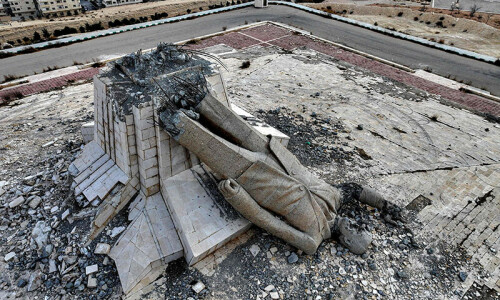LAHORE: People living in Nathia Gali (Ayubia National Park) are confronted with a host of issues from deforestation to solid waste management and from human-leopard conflict to impact of communities on the forest.
To add fuel to fire, the government, according to locals, is planning an urban development project near and around the national park which, according to environmentalists and wildlife experts, would be devastation for the natural atmosphere around the park.
The Galiyat Development Authority (GDA) plans to make six new towns, a theme park and big hotels in the area that can seriously affect the habitat of birds of animal species, especially the common leopard.
Talking to journalists from Lahore and Karachi, who the World Wide Fund for Nature-Pakistan took to the area, community members in a village, Namli Maira, near Donga Gali said the WWF-Pakistan helped them with its projects, however, the GDA had never listened to their woes.
The community requested the media and the WWF-Pakistan to provide them with dustbins for solid waste and sought a watch and warden system in forests to stop illegal felling of trees.
Zulfiqar Ahmed and Abdul Shakoor, two locals, emphasized the need to mobilise government to resolve the issues of the people living in Galiyat.
New urban development to damage national park
The natural springs, the backbone of clean water supply, are drying up due to deforestation and increasing settlements and hotels.
Another issue is that of solid waste as hotels don’t have any sewerage system and people dump their waste in the open, polluting springs and leading to various water-borne diseases.
WWF-Pakistan in order to protect the springs from pollution made water tanks to provide safe drinking water to the area besides fencing of the springs.
The WWF-Pakistan Watershed Management Project has been launched under which research is being conducted to assess the reasons behind short, quick and sudden rainfall due to climate change.
To tackle the issue of deforestation and to reduce the impacts of communities on forest, the WWF-Pakistan has introduced fuel efficient stoves that consume 30pc less wood as people are mostly dependent on firewood despite the introduction of liquefied petroleum gas (LPG).
A particular type of tree Taxus wallichiana (Burmi) was being cut rapidly as its wood was being used in graves, building houses and furniture. It became endangered due to excessive felling. WWF-Pakistan started advocacy for conservation of Taxus wallichiana and sensitised religious leaders to it and now people have agreed to shift to alternative solution (RCC slab).
The human-leopard conflict in Nathia Gali and adjacent areas is another major issue. The WWF-Pakistan started common leopard conservation project in 2010 to investigate the increasing reasons of human-leopard conflict and began training students regarding the importance of common leopard for the ecosystem.
WWF-Pakistan wildlife expert Muhammad Waseem said for the first time in the history of Pakistan, a male common leopard was radio collared by WWF-Pakistan on Sept 1, 2013. He said that in 2005, a common leopard had gone man-eater which lead to 17 attacks and seven killings in the year, forcing the wildlife department to shoot the leopard down.
Since there are no ungulates (wild goats) in the area, the leopards have to rely on red fox, wild boar, birds, small mammals for its survival which are sufficient for it and that’s the main reason for human-leopard conflict and increasing attacks of leopard on domestic livestock.
Published in Dawn, June 8th, 2015
On a mobile phone? Get the Dawn Mobile App: Apple Store | Google Play





















































